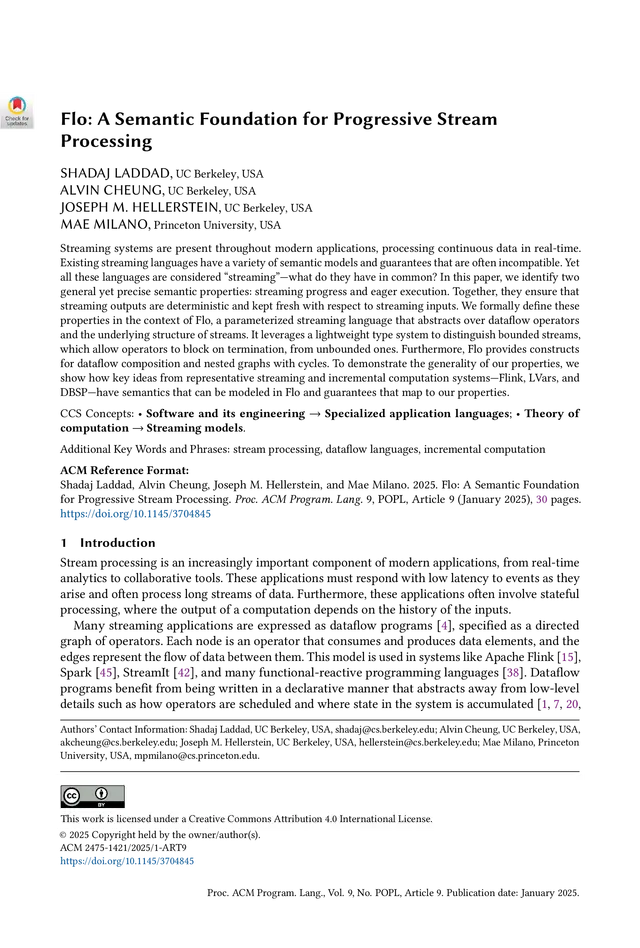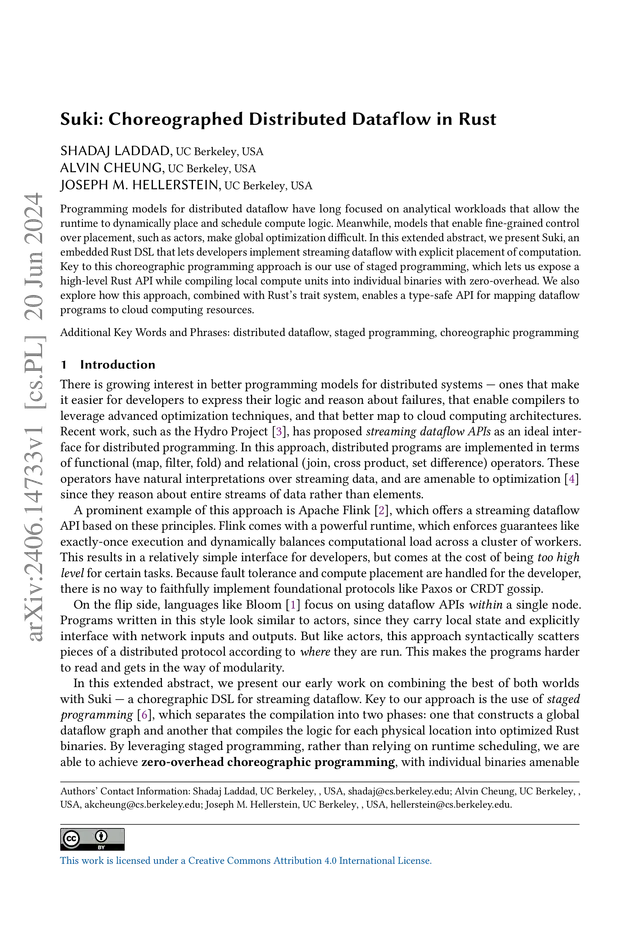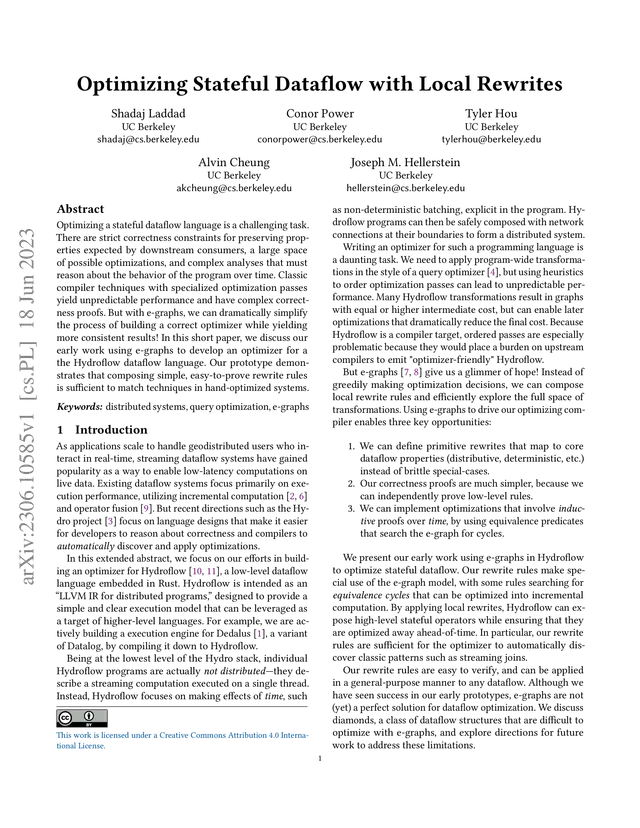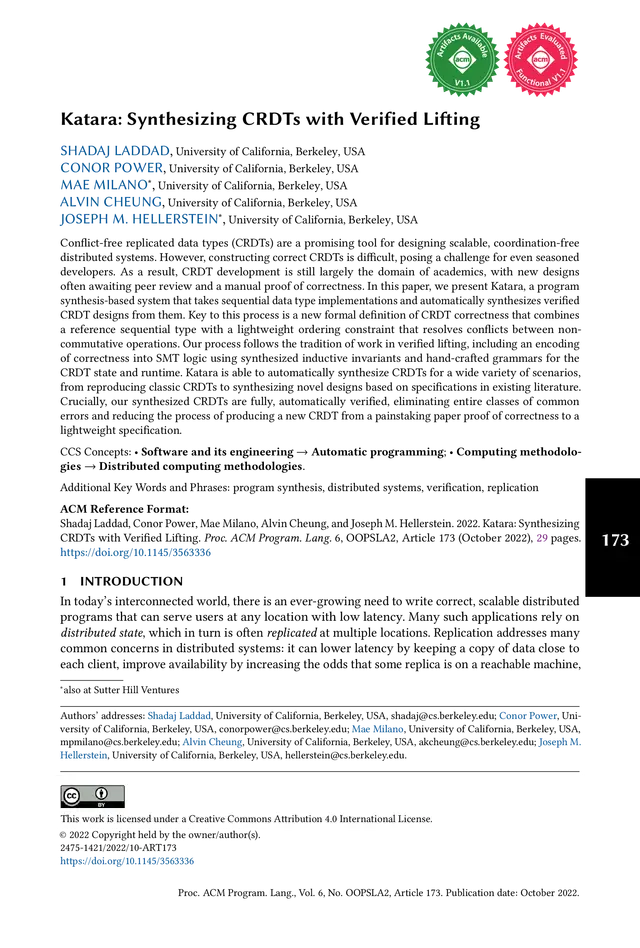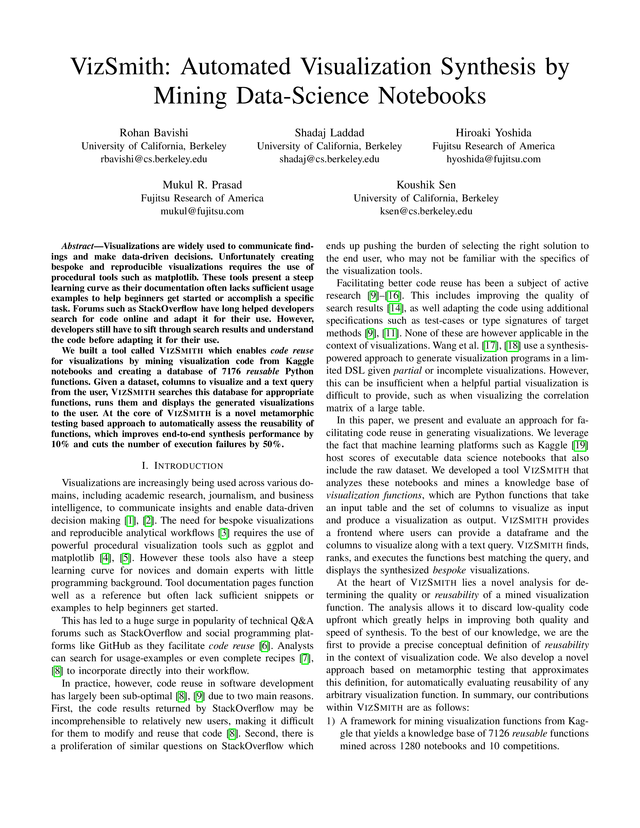Hi, I'm Shadaj
I explore the boundaries of programming
Hi, I'm Shadaj
I explore the boundaries of programming
Latest News
Students Advised and Mentored
I've had the great pleasure of mentoring several talented undergraduate students at Berkeley. In my group, students lead research projects that stand on their own. Their projects have been written up as academic papers and upstreamed as production-ready contributions. I primarily recruit students from the Diversifying Access to Research in Engineering program.
- Tyler Hou: theoretical foundations for e-graphs and applications in query optimization (third prize, POPL 2024 Student Research Competition)
- Ryan Alameddine (c/o 2025 → Databricks): compiling async/await functions to streaming dataflow (third prize, POPL 2025 Student Research Competition)
- Nick Jiang: support for Kubernetes deployments in Hydro Deploy
- Amrita Rajan (c/o 2023 → Doordash): language features for static data in the Hydro Datalog compiler
- David Wei (c/o 2022 → founding engineer → Waymo): formally verifying algebraic properties for CRDTs
Publications
Programming Models for Correct and Modular Distributed Systems
Shadaj Laddad
Distributed systems are a fundamental part of modern computing, but they are notoriously difficult to program. Developers must reason about a wide variety of non-deterministic behaviors, including message reordering, retries, and failures, all while also having to deal with the inherent concurrency across machines. In this dissertation, we present a new foundation for distributed programming that offers richer correctness guarantees and enables new opportunities for modularity. We reify this model in a Rust framework called Hydro, which leverages staged programming to expose a high-level streaming interface while compiling down to bare-metal binaries.
Flo: a Semantic Foundation for Progressive Stream Processing
Shadaj Laddad, Alvin Cheung, Joseph M. Hellerstein, Mae Milano
Existing streaming languages have a variety of semantic models and guarantees that are often incompatible. In this paper, we identify two general yet precise semantic properties: streaming progress and eager execution. We formally define these properties in the context of Flo, a parameterized streaming language that abstracts over dataflow operators and the underlying structure of streams. To demonstrate the generality of our properties, we show how key ideas from representative streaming and incremental computation systems—Flink, LVars, and DBSP—have semantics that can be modeled in Flo and guarantees that map to our properties.
Suki: Choreographed Distributed Dataflow in Rust
Shadaj Laddad, Alvin Cheung, Joseph M. Hellerstein
Programming models for distributed dataflow have long focused on analytical workloads that allow the runtime to dynamically place and schedule compute logic. Meanwhile, models that enable fine-grained control over placement, such as actors, make global optimization difficult. In this extended abstract, we present Suki, an embedded Rust DSL that lets developers implement streaming dataflow with explicit placement of computation. Key to this choreographic programming approach is our use of staged programming, which lets us expose a high-level Rust API while compiling local compute units into individual binaries with zero-overhead.
Towards Relational Contextual Equality Saturation
Tyler Hou, Shadaj Laddad, Joseph M. Hellerstein
Optimizing Distributed Protocols with Query Rewrites
David Chu, Rithvik Panchapakesan, Shadaj Laddad, Lucky E. Katanahas, Chris Liu, Kaushik Shivakumar, Natacha Crooks, Joseph M. Hellerstein, Heidi Howard
Distributed protocols such as 2PC and Paxos lie at the core of many systems in the cloud, but standard implementations do not scale. This paper presents an approach for scaling any distributed protocol by applying rule-driven rewrites, borrowing from query optimization. Manual rule-driven applications of decoupling and partitioning improve the throughput of 2PC by 5x and Paxos by 3x, and match state-of-the-art throughput in recent work.
Shadaj Laddad*, Conor Power*, Mae Milano, Alvin Cheung, Natacha Crooks, Joseph M. Hellerstein
CRDT guarantees extend only to data updates; observations of CRDT state are unconstrained and unsafe. We propose an agenda that embraces the simplicity of CRDTs, but provides richer, more uniform guarantees. We extend CRDTs with a query model that reasons about which queries are safe without coordination by applying monotonicity results from the CALM Theorem.
Towards Auto-Generated Data Systems
Alvin Cheung, Maaz Bin Safeer Ahmad, Brandon Haynes, Chanwut Kittivorawong, Shadaj Laddad, Xiaoxuan Liu, Chenglong Wang, Cong Yan
Optimizing Stateful Dataflow with Local Rewrites
Shadaj Laddad, Conor Power, Tyler Hou, Alvin Cheung, Joseph M. Hellerstein
Optimizing a stateful dataflow language is a challenging task. There are strict correctness constraints for preserving properties expected by downstream consumers, a large space of possible optimizations, and complex analyses that must reason about the behavior of the program over time. But with e-graphs, we can dramatically simplify the process of building a correct optimizer while yielding more consistent results! In this short paper, we discuss our early work using e-graphs to develop an optimizer for the Hydroflow dataflow language.
Initial Steps Toward a Compiler for Distributed Programs
Joseph M. Hellerstein, Shadaj Laddad, Mae Milano, Conor Power, Mingwei Samuel
Code Transpilation for Hardware Accelerators
Yuto Nishida, Sahil Bhatia, Shadaj Laddad, Hasan Genc, Yakun Sophia Shao, Alvin Cheung
Katara: Synthesizing CRDTs with Verified Lifting
Shadaj Laddad, Conor Power, Mae Milano, Alvin Cheung, Joseph M. Hellerstein
In this paper, we present Katara, a program synthesis-based system that takes sequential data type implementations and automatically synthesizes verified CRDT designs from them. Katara is able to automatically synthesize CRDTs for a wide variety of scenarios, from reproducing classic CRDTs to synthesizing novel designs based on specifications in existing literature. Crucially, our synthesized CRDTs are fully, automatically verified, eliminating entire classes of common errors and reducing the process of producing a new CRDT from a painstaking paper proof of correctness to a lightweight specification.
VizSmith: Automated Visualization Synthesis by Mining Data-Science Notebooks
Rohan Bavishi, Shadaj Laddad, Hiroaki Yoshida, Mukul R. Prasad, Koushik Sen
We built a tool called VizSmith which enables code reuse for visualizations by mining visualization code from Kaggle notebooks and creating a database of 7176 reusable Python functions. Given a dataset, columns to visualize and a text query from the user, VizSmith searches this database for appropriate functions, runs them and displays the generated visualizations to the user.
Fluid Quotes: Metaprogramming across Abstraction Boundaries with Dependent Types
Shadaj Laddad and Koushik Sen
We introduce Fluid Quotes, a new technique that uses dependent types to let users pass quotes through abstraction boundaries in runtime code while splicing them ahead-of-time. This technique enables new metaprogramming capabilities by eliminating the traditional requirement of co-locating parameter expressions with call-sites. Fluid Quotes capture not only source code but also associated runtime context to ensure correctness.
ScalaPy: Seamless Python Interoperability for Cross-Platform Scala Programs
Shadaj Laddad and Koushik Sen
Fellowships and Awards
- UC Berkeley Tong Leong Lim Pre-Doctoral Prize (2023)
- NSF Graduate Research Fellowship (2021)
- UC Berkeley EECS Major Citation (2021)
- UC Berkeley Foreign Language and Area Studies Fellowship (2019)
- NDSEG Graduate Fellowship - Honorable Mention (2022)
- Neo Scholar (2020)
- UC Berkeley Eta Kappa Nu (2019)
- UC Berkeley College of Engineering Dean's List (2019)

